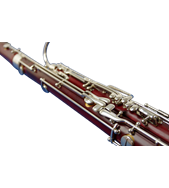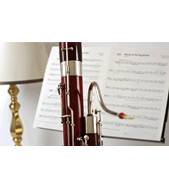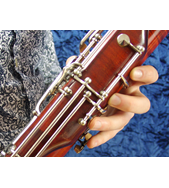Seven crucial questions to ask when buying a bassoon
April 1st, 2021

Seven crucial questions to ask when buying a bassoon
Article Author: Oliver Ludlow, Director and Bassoon Specialist at Double Reed Ltd.
So you need a bassoon – but where do you start? Once the options on the “beg, borrow or steal” front have run out, the bassoonist is confronted with the need to buy one.
This can trigger the start of a stressful process - how to decide what to buy, where to buy from, how much to spend and how to avoid buying a dud?
To help you make an informed decision, we have compiled a list of the most important questions to ask during the process of buying a bassoon:
1. Where will I be playing?
The first question you will need to ask is, where will I be playing my bassoon? Whether you are an amateur or a professional player, or somewhere in between, will help determine the kind of instrument you ought to buy.
Will you be playing in large concert halls as part of a professional orchestra? If so, the level of keywork the bassoon has, its ability to project, its tone, intonation and pitch are all very important to your decision.
If you tend to play in smaller, amateur groups, then some of these characteristics may be less vital.
At Double Reed Ltd. we group bassoons (broadly speaking) into three categories – student level bassoons, intermediate level bassoons, and professional level bassoons. Considering which of these categories your playing fits into will help you decide what bassoons to consider.
A knowledgeable supplier will be able to give you advice on what level of bassoon you are likely to need, and help narrow down the options for you.
2. Do I want to buy a new or secondhand bassoon?
The next question to ask is, do I want to buy new or secondhand?
Bassoons have an impressive life-span – many are still being played to a high standard after many decades (and some at more than a hundred years old). Buying new is of course an option, but when buying new you pay a premium for being the first owner of that instrument.
A new bassoon, compared to a good quality secondhand bassoon of the same make and model, will be a lot more expensive. Buying secondhand therefore gives you the opportunity to put that cost difference to good use – you could buy a better quality, higher specification secondhand bassoon with the same budget.
3. Where do I buy a bassoon?
If you choose to buy secondhand, as most bassoonists do, it is important to consider the state it is in when you buy it, as well as how reputable the seller is.
If, when you come to play test the bassoon, it needs servicing or repairing, it will be difficult to assess it sufficiently enough to determine if it is a quality bassoon.
It is unwise to assume that any issues you are having with the bassoon when you play test it – intonation issues, leaks, poor tone, pitch, stuffy notes etc. – will be fixed by a simple service or repair. Some bassoons, unfortunately, fail in these areas even in top condition.
Look for a trustworthy supplier, who will have already done the hard work of selecting the best instruments available, sifting out the duds, and servicing their bassoons to a high standard. A reputable supplier should also be confident enough in the quality of their work to provide a warranty with the purchase of a bassoon.
Look at the supplier’s customer service levels in general – do they have knowledgeable staff? Do they have ‘try before you buy’ and ‘buy back’ schemes? Do they have a high-quality workshop for repairs and servicing in-house, or do they have to outsource their work? All of these are signals that the supplier is confident in the quality of their work, and has the willingness and skills to provide after purchase support if it is necessary.
Buying a bassoon is a significant investment, and although they hold their value remarkably well, purchasing from a trustworthy source is crucial for minimising the potential risks.
Assessing bassoons:
Once you have answered the above questions, and are ready to play test and assess a bassoon, there are several further questions which you need to answer.
4. Has the bassoon been properly set-up and serviced?
You should check whether:
- the keywork operates as it should
- any of the keys are stiff or binding
- any of the keys are noisy
- the action is comfortable
- the key heights are too high or too low
- the crook set-up is suitable
- the bore is clean and oiled
- the keys are clean
- the pads are white, clean and soft
- there are no signs of untreated rot under the U-bend (rough or soft wood in particular)
- there are no cracks, particularly on the tenons (or, at least, if present have been repaired to a professional standard)
- the open toneholes do not have worn edges or show signs of water damage
- there are no leaks by carrying out pressure tests* (see end of article for tips on pressure tests)
None of the above are necessarily a problem for a bassoon, but consider the hassle and cost of making after-purchase repairs, and bear in mind that a reputable seller should sort these things out prior to sale.
5. Is the pitch and intonation good enough?
Check the pitch and intonation against a tuner (the crook and the reed will make a difference, so changing either will affect the pitch as will adjusting the amount the crook is inserted into the wing joint).
Play the bassoon from top to bottom. Bear in mind that no bassoon, not even a brand new Heckel, has perfect intonation; certain notes will be slightly too sharp or flat. Obviously, the more you pay the better the intonation should be, but some compromise will inevitably be needed. However, a properly set up bassoon of any age should have decent intonation at least, and should not compromise your ability to play to the required standard.
6. Is it comfortable to play?
Take time to get to know the layout of the keywork and the particular characteristics of the bassoon, as all bassoons are different. This may take several hours of playing depending on your experience.
After you have got used to the bassoon and any differences in key spacing, etc. check that you can play it comfortably. If the keys are too much of a stretch, try adjusting the hand-rest. If it is heavier than you are used to, then try a seat strap or harness. But ultimately, if you cannot get comfortable with the bassoon you may need to think again.
7. Do I like the bassoon?
Finally, when you have run through everything else comes the most important tip of all: do you like the bassoon? Listen while you play to its character, and ask others to listen with you to provide feedback. Does it look, sound and feel right in your hands? For some people the look is paramount (new-looking or with patina), for others the tone is paramount (that beautifully resonant old-Heckel-type sound, for example). For others, it just has to feel right in their hands.
A bassoon is a big investment and you will ideally be spending a lot of time with it, so when all is said and done, make sure you love it. In the end, it is your decision and yours alone, so although teachers, colleagues and fellow-bassoonists may all have their views, it will ultimately be you that plays this bassoon for years to come.
Contact us for advice on buying a bassoon – we have a wide range available and will be happy to help you find a bassoon that matches your requirements.
*Pressure tests
Take each joint separately, close all the keys and open tone holes, put your hand over one end and blow. If you can hear any air leaking then it is likely to be one or more pads are either too old or are not seated properly (or an unsealed crack is present or, in the case of the butt joint, the U bend is not seated properly). Any detectable air leaks will affect the playability of the bassoon quite profoundly. An alternative test is to suck rather than blow air through each joint. Each joint should hold a vacuum for a little while. If it fills up with air immediately then there is a leak.



